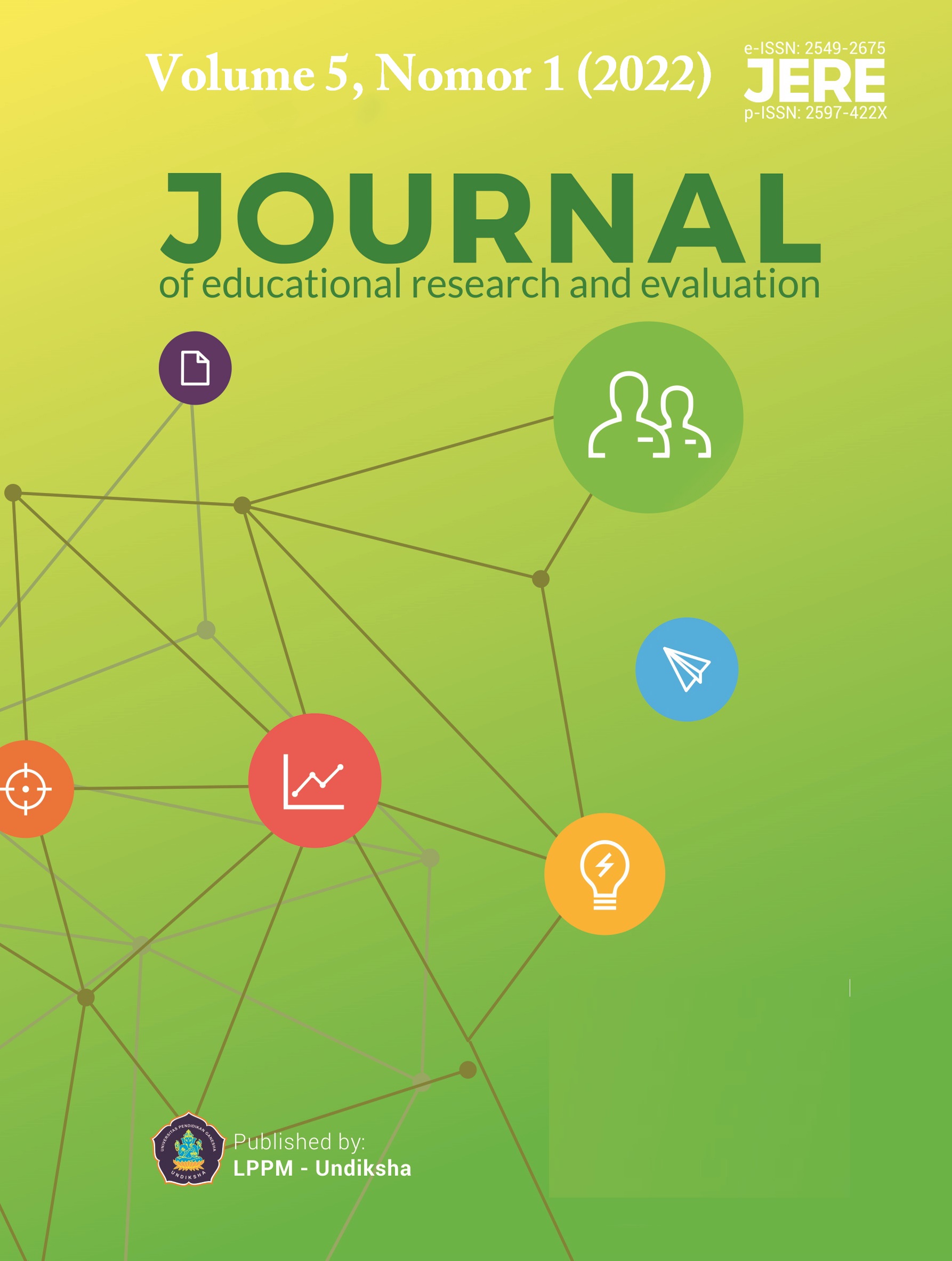The Effect of Problem Based Learning Models in Online Learning Settings on Student Cognitive Learning Outcomes in History Subjects
DOI:
https://doi.org/10.23887/jere.v5i1.29654Keywords:
Problem based learning, online learning, cognitive learning outcomesAbstract
This study aims to examine the effect of problem-based learning models on the achievement of student learning outcomes in History subjects. This research was conducted at Pusaka 1 Jakarta Senior High School. The method used in this research is quantitative quasi-experimental with a nonequivalent control group design model. The population in this study were all students of class XI IPS as many as four classes at SMAS Pusaka 1 Jakarta. The research sample was determined by purposive sampling technique to determine one class as an experimental class using a problem-based learning model and another class as a control class using conventional learning models. The results of hypothesis testing using the t test, obtained tcount = 9.25,> from ttable = 1.99. Thus, Ho is rejected and Ha is accepted, so it can be concluded that there is a significant influence between problem-based learning models in online learning settings on cognitive learning outcomes of class XI IPS at SMAS Pusaka 1 Jakarta on History Subjects.
References
Ahyanuardi, A., Hambali, H., & Krismadinata, K. (2018). Pengaruh Kompetensi Pedagogik Dan Profesional Guru Sekolah Menengah Kejuruan Pasca Sertfikasi Terhadap Komitmen Guru Melaksanakan Proses Pembelajaran. INVOTEK: Jurnal Inovasi Vokasional Dan Teknologi, 18(1), 67–74. https://doi.org/10.24036/invotek.v18i1.169.
Astuti, S. (2017). Supervisi Akademik Untuk Menigkatkan Kompetensi Guru Di SD Lboratorium Uksw. Scholaria, 7(1), 49–59. https://doi.org/10.24246/j.scholaria.2017.v7.i1.p49-59.
Choi, E., Lindquist, R., & Song, Y. (2014). Effects of problem-based learning vs. traditional lecture on Korean nursing students’ critical thinking, problem-solving, and self-directed learning. Nurse Education Today, 34(1), 52–56. https://doi.org/10.1016/j.nedt.2013.02.012.
Erawanto, U., & Santoso, E. (2016). Pengembangan Modul Pembelajaran Berbasis Masalah Untuk Membantu Meningkatkan Berfikir Kreatif Mahasiswa. JINoP (Jurnal Inovasi Pembelajaran), 2(2), 427. https://doi.org/10.22219/jinop.v2i2.2629.
Fiqri, Y. Al, Kurniawati, K., & Sarkadi, S. (2018). Pengaruh Metode Pembelajaran dan Minat Baca Terhadap Hasil Belajar Sejarah Siswa SMAN 01 Argamakmur Bengkulu Utara. JTP - Jurnal Teknologi Pendidikan, 20(1), 73–86. https://doi.org/10.21009/JTP2001.6.
Fitriyani, Y., Fauzi, I., & Sari, M. Z. (2020). Motivasi Belajar Mahasiswa Pada Pembelajaran Daring Selama Pandemik Covid-19. Profesi Pendidikan Dasar, 7(1), 121–132. https://doi.org/10.23917/ppd.v7i1.10973.
Ghazali, A. (2019). Urgensi pendidikan karakter yang sesuai dengan falsafah bangsa indonesia. Kajian Pendidikan Islam Dan Studi Islam, 2(1), 16–31.
Hallinger, P., & Bridges, E. M. (2017). A Systematic Review of Research on the Use of Problem-Based Learning in the Preparation and Development of School Leaders. Educational Administration Quarterly, 53(2), 255–288. https://doi.org/10.1177/0013161X16659347.
Mustari, M., & Rahman, M. T. (2014). Manajemen Pendidikan (R. G. Persada (ed.); pp. 226–258).
Pinandita, I. Purwanti, E., & Utoyo, B. (2012). Pengaruh teknik Relaksasi Genggam Jari Terhadap Penurunan Intensitas Nyeri Pada Pasien Post Operasi Laparatomi. Jurnah Kesehatan Perawatan, 8(1), 32–43. http://ejournal.stikesmuhgombong.ac.id/JIKK/article/view/66.
Qomariyah, S. N. (2019). Effect of Problem Based Learning Learning Model to Improve Student Learning Outcomes. International Journal of Educational Research Review, 2009, 217–222. https://doi.org/10.24331/ijere.518056.
Ramdani, Z., Amrullah, S., & Felisima Tae, L. (2019). Pentingnya Kolaborasi dalam Menciptakan Sistem Pendidikan yang Berkualitas. MediaPSI, 5(1), 40–48. https://doi.org/10.21776/ub.mps.2019.005.01.4.
Subekt, H., Taufiq, M., Susilo, H., Ibrohim, I., & Suwono, H. (2017). Mengembangkan Literasi Informasi Melalui Belajar Berbasis Kehidupan Terintegrasi Stem Untuk Menyiapkan Calon Guru Sains Dalam Menghadapi Era Revolusi Industri 4.0: Revieu Literatur. Education and Human Development Journal, 3(1), 81–90. https://doi.org/10.33086/ehdj.v3i1.90.
Supriatna, A. (2018). Kegiatan Lesson Study sebagai Upaya Guru untuk Menemukan Pembelajaran yang Memenuhi Keperluan Anak Hidup pada Zamannya (Era Revolusi Industri 4.0). Edusainstek, 1(1), 1–5.
Ulger, K. (2018). The effect of problem-based learning on the creative thinking and critical thinking disposition of students in visual arts education. Interdisciplinary Journal of Problem-Based Learning, 12(1). https://doi.org/10.7771/1541-5015.1649.
Wahyono, P., Husamah, H., & Budi, A. S. (2020). Guru profesional di masa pandemi COVID-19: Review implementasi, tantangan, dan solusi pembelajaran daring. Jurnal Pendidikan Profesi Guru, 1(1), 51–65. https://doi.org/10.22219/jppg.v1i1.12462.
Wijaya, H. (2018). Pengembangan Ilmu Pendidikan Berbasis Pendidikan Karakter Untuk meningkatkan Kecerdasan Spiritual. Researchgate.Net, 0–16.
Wulansari, T., Putra, A., Rusliah, N., & Habibi, M. (2019). Pengaruh Model Pembelajaran Berbasis Masalah Pada Materi Statistika Terhadap Kemampuan Penalaran Statistis Siswa. Jurnal Aksioma: Jurnal Matematika Dan Pendidikan Matematika, 10(1), 35–47.
Yulianti, D., Wiyanto, Rusilowati, A., Nugroho, S. E., & Supardi, K. I. (2019). Problem based learning models based on science technology engineering and mathematics for developing student character. Journal of Physics: Conference Series, 1170(1), 1–5. https://doi.org/10.1088/1742-6596/1170/1/012032.
Downloads
Published
How to Cite
Issue
Section
License
Authors who publish with the Journal of Evaluation and Research in Education (JERE) agree to the following terms:
- Authors retain copyright and grant the journal the right of first publication with the work simultaneously licensed under a Creative Commons Attribution License (CC BY-SA 4.0) that allows others to share the work with an acknowledgment of the work's authorship and initial publication in this journal.
- Authors are able to enter into separate, additional contractual arrangements for the non-exclusive distribution of the journal's published version of the work (e.g., post it to an institutional repository or publish it in a book), with an acknowledgment of its initial publication in this journal.
- Authors are permitted and encouraged to post their work online (e.g., in institutional repositories or on their website) prior to and during the submission process, as it can lead to productive exchanges, as well as earlier and greater citation of published work. (See The Effect of Open Access)











